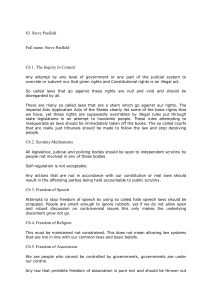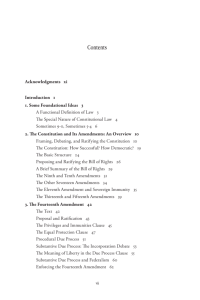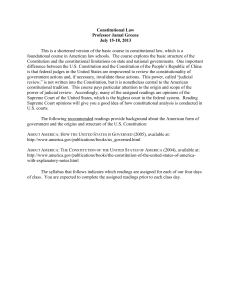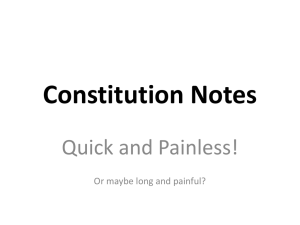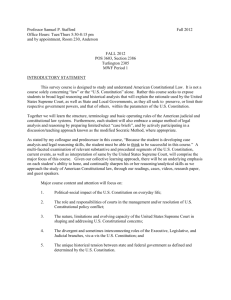• •
advertisement
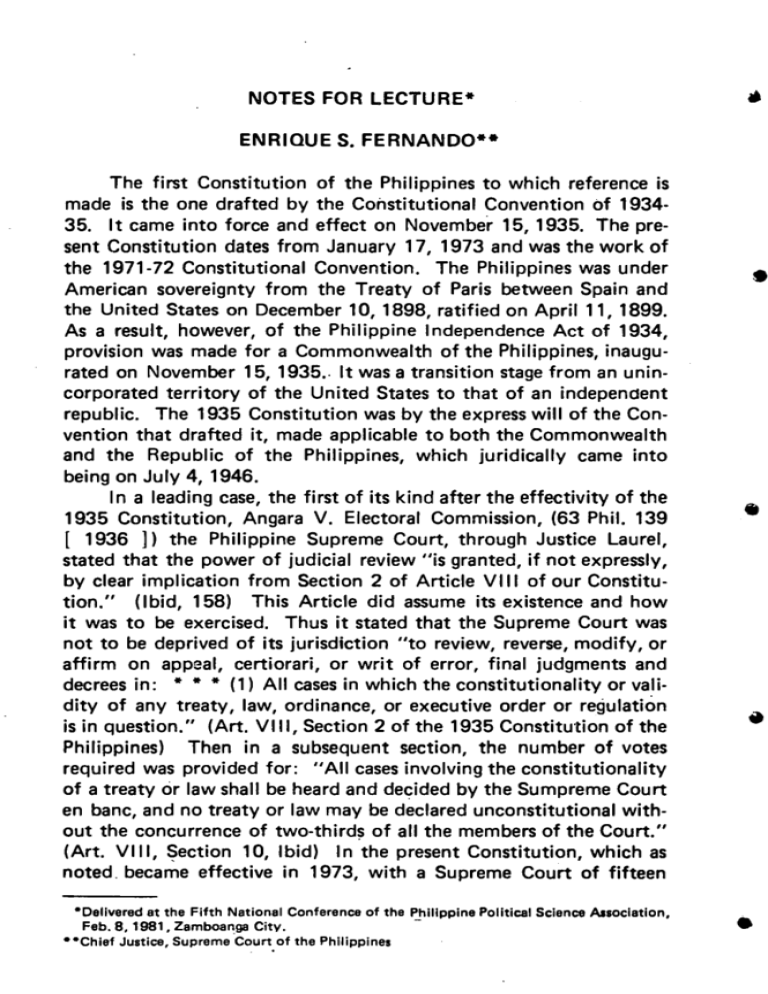
NOTES FOR LECTURE*
ENRIQUE S. FERNANDO**
The first Constitution of the Philippines to which reference is
made is the one drafted by the Constitutional Convention of 193435. It came into force and effect on November 15, 1935. The present Constitution dates from January 17, 1973 and was the work of
the 1971-72 Constitutional Convention. The Philippines was under
American sovereignty from the Treaty of Paris between Spain and
the United States on December 10, 1898, ratified on April 11, 1899.
As a result, however, of the Philippine Independence Act of 1934,
provision was made for a Commonwealth of the Philippines, inaugurated on November 15, 1935.. It was a transition stage from an unincorporated territory of the United States to that of an independent
republic. The 1935 Constitution was by the express will of the Convention that drafted it, made applicable to both the Commonwealth
and the Republic of the Philippines, which juridically came into
being on July 4, 1946.
In a leading case, the first of its kind after the effectivity of the
1935 Constitution, Angara V. Electoral Commission, (63 Phil. 139
[ 1936 ]) the Philippine Supreme Court, through Justice Laurel,
stated that the power of judicial review "is granted, if not expressly,
by clear implication from Section 2 of Article VIII of our Constitution." (I bid, 158) This Article did assume its existence and how
it was to be exercised. Thus it stated that the Supreme Court was
not to be deprived of its jurisdiction "to review, reverse, modify, or
affirm on appeal, certiorari, or writ of error, final judgments and
decrees in: * * * (1) All cases in which the constitutionality or validity of any treaty, law, ordinance, or executive order or regulation
is in question." (Art. VIII, Section 2 of the 1935 Constitution of the
Philippines) Then in a subsequent section, the number of votes
required was provided for: "AII cases involving the constitutionality
of a treaty or law shall be heard and decided by the Sumpreme Court
en banc, and no treaty or law may be declared unconstitutional without the concurrence of two-thirds of all the members of the Court."
(Art. VIII, Section 10, Ibid) In the present Constitution, which as
noted. became effective in 1973, with a Supreme Court of fifteen
-Delivered at the Fifth National Conference of tha Philippine Political Science Association,
Feb. 8.1981. Zamboanga City.
- -Chief Justice, Supreme Court. of the Philippines
•
•
•
FERNANDO/55
•
•
•
•
•
members, four more than was formerly the case, there is this modification:' "All cases involving the constitutionality of a treaty, executive agreement, or law shall be heard and decided by the Supreme
Court en bane, and no treaty, executive agreement, or law may be
declared unconstitutional without the concurrence of at least ten
Members." (Art. X, Section 2, par. (2) of the present Constitution
of the Philippines.)
A brief historical background is not amiss. At the time when
the United States acquired the Philippines from Spain in 1899, one
of the principles of constitutional law binding on the territorial
government estabished by her in the Philippines was this principle
of judicial review. It was natural for American lawyers, admitted to
practice in the Philippines, to challenge the validity of statutes or
executive orders, whenever the interests of their clients so demanded.
For the Americans in.the judiciary, constituting the majority in the
Supreme Court, that was to be expected. It is to the credit of those
early Filipino justices and judges, trained in the European. tradition
of public law, that they were equally cognizant of the power to pass
on the constitutionality of such statutes and executive orders as part
of their judicial function. Soon the Filipino lawyers vied with the
American members of the bar in raising constitutional questions.
The American practice therefore of appealing to courts, by means
of lawsuits, decisions reached by either the executive or legislative
branches of the government, became a part of the accepted constitionaI law doctrines in the Philippines early in the period of American sovereignty.
It suffices to state that before the adoption of the Constitution
of the Philippines in 1935, the Philippine Supreme Court had anulled
thirteen legislative acts. In seven of those cases, the decisions turned
upon the powers to be exercised by courts of the Philippines under
the organic acts. (Omo v. Insular Government, 11 Phil. 67 [1908];
Wigall v, Shuster, 11 Phil. 340 [1908]; Barrameda v, Moir, 25 Phil.
44 [1913]; McGirr v, Hamilton and Abreau, 30 Phil. 563 [1915];
Concepcion v. Paredes, 42 Phil. 599 [1921]; Agcaoili v, Sugitan, 48
Phil. 676 [1926]; Manila Electric Co. v. Pasay Transp. Co., 57 Phil.
600 [1932]) Property rights were safeguarded in four cases. (Casanovas v. Hord, 8 Phil. 125 [1907]; Compania Gral. de Tabacos v,
Board of Public Utility, 34 Phil. 136 [1916]; US v. Ang Tang Ho, 43
Phil. 1 [1922]; People v. Pomar, 46 Phil. 440 [1924]) One case had
serious political implications: the Supreme Court was asked to
decide a conflict between the American Governor-General and the
Filipino legislative leadership in the government, as to where the
56/Philippine Political Science Journal June and December 1981
powerto appoint directors in government-owed or controlled corporations was vested. (Government of the Phil. Islands v. Springer, 50
Phil. 259 [1927]) Its decision had nationalistic overtones, all the
Americans on the bench and one Filipino sustaining the claim of the
Governor-General and the remaining Filipino members upholding
the contention of the legislative leaders.
Then came the period under the 1935 and the present Constitutions. The function of judicial review has continued to flourish. The
Philippine Supreme Court has not been reluctant to perform such a
delicate task. It has not gone out of its way to entertain constitutional questions, but it has shown no hesitancy to act on such matters
in appropriate cases. Such an attitude is traceable to the valedictory
address before the 1934 Constitutional Convention of its President,
Claro M. Recto, who spoke of the trust reposed in the judiciary in
these words: "It is one of the paradoxes of democracy that the people at times place more confidence in instrumentalities of the State
other than those directly chosen by them for the exercise of their
sovereignty."
There was thus popular support for the Supreme
Court ever being on the alert to assure compliance with constitutional
commands. Whenever its jurisdiction is properly invoked then, it
must discharge this function. It must inquire into alleged breaches of
the fundamental law. It should, within the limits of the judicial
power, assure that no infringement is allowed. That is implicit in the
process of adjudication which consists of determining the facts and
applying the law. To do so is to be true to its duty as the Constitution being supreme overrides the act of any governmental agency.
That is a postulate that goes back to the landmark American
decision of Marbury v. Madison. (3 Cranch 137 [1803]) Judicial review is not an intrusion into the domain belonging to the political
branches. The judiciary has to act thus to reach a decision in a case
before it, wherein rights appropriate for judicial enforcement are
sought to be vindicated. Nor does it approach constitutional questions with dogmatism or apodictic certainty. There is likewise the
expectation that there would be a search for jural consistency and
rational coherence. Once allowance is made that for all the care
and circumspection, courts are manned by human beings fettered
by fallibility, but nonetheless earnestly and sincerely striving to do
right, the continuing public acceptance of its vigorous pursuit of
the task of assuring fealty to the Constitution is easy to understand.
The stress and emphasis thus laid on the courts utilizing fully
the device of judicial review as an institution for assuring the supremacy of the Constitution, as thus briefly characterized, has been
•
•
•
.'
•
FERNANDO/57
•
.
.'
•
termed, in language that has gained currency, judicial activism. It
manifests an alertness on the part of the judiciaryto the probability
that a constitutional infraction may be detected in the acts of the
coordinate agencies of the government. The judiciary, to repeat, has
, to await for an appropriate case, as the exercise of such competence ,
is based on its power to adjudicate. There must, however, be no reluctance to pass upon the question when properly raised. It is not
only the readiness to pass upon cases that give rise to such issues but
also the propensity to see to it in the decision rendered that there be
, full fidelity to what the Constitution ordains. So, it is submitted,
judicial activism requires. For clarity of analysis, it seems appropriate to discuss the exercise of such power in terms of whether legislative or executive acts are concerned. There is the further distinction to be made between the exercise of legislative or constituent
functions by a lawmaking body. Again with reference to the executive, it has happened three times under the present martial law
regime that what was done by the incumbent Presidentof the Philippines,' twice in connection with the ratification of the present Constitution and only recently with the proposed amendments, that the
Supreme Court had to inquire into its validity.
It would not be strictly accurate though to assert that judicial
activism is invariably the norm followed. At times, the question
raised is political to follow the traditional constitutional law terminology of the American type. As understood in this jurisdiction, it
refers, as noted in the opinion of the then Justice, later ChiefJustice,
Roberto Concepcion speaking for the Supreme Court in Tanada v.
Cuenco (103 Phil. 1051 [1957]) to "questions which under the
Constitution are to be decided by the people in their sovereign capacity, or in regard to which full discretionary authority has been
delegated to the legislature or executive branch of the Government.'
It is concerned with issues dependent upon the wisdom, not legality
of a political measure." (Ibid, 1067) If so, the principleof judicial
self-restaint prevails. There must be respect and deference shown to
what was decided in such other forum. It is not for the judiciary to
interfere. Such a matter is outside its jurisdiction. Even on a matter
concededly within its competence, it may avail itself of the techniques of avoidance, relying on compliance with certain standards
to call into play the power of judicial review, thus enabling it to base
its decision on a non-constitutional ground. (Cf. Ashwander v.
Tennessee Valley Authority, 297 US 298) That is to manifest a realization by the Supreme Court of the delicate and awesome character
of the function of judicial review. The cause of clarity will likewise
58/Philippine Political Science Journal June and December 1981
be served if the discussion proceeds chronoloqicallv by referring to
the leading Supreme Court decisions from the aforecited Angara
decision, People v. Vera, (65 Phil. 56) promulgated in 1937, with the
opinion likewise coming from Justice Laurel up to and including
Sanidad v, Commission on Elections, (L-44640, Guzman v. Commission on Elections, L-44714 were decided jointly with Sanidad) that
came out only on October 12, 1976, with the nine of ten members
of the Supreme Court, headed by ChiefJustice Fred Ruiz Castro, expressing their views. In between those times, other cases of importance with opinions from former Chief Justice Concepcion, like
Justice Laurel, an eminent constitutionalist, wilt be cited.
To go back to Angara, truly a landmark decision, the question
raised was whether a resolution of the National Asembly, the then
unicameral legislative body of the Commonwealth of the Philippines
under the 1935 Constitution, confirming the election of petitioner
as an assemblyman as no protest was filed against him by December
3, 1935, could stand as against a contrary resolution of respondent
Electoral Commission, as an independent Constitutional body entrusted with deciding electoral contests involving election, returns
and qualifications of the members of the National Assembly, fixing
the last date as of December 8, 1935. As the protest against petitioner Angara came after December 3 but before December 8, he
instituted a suit for prohibition to restrain respondent Commission
from proceeding further. He contended that the question raised was
political rather than judicial. The Supreme Court through Justice
Laurel ruled otherwise. He stated: liAs any human production, our
Constitution is of course lacking perfection and perfectibility, but as
much as it was within the power of our people, acting through their
delegates to so provide, that instrument which is the expression of
their sovereignty, however limited, has established a republican
government intended to operate and function as a harmonious
whore, under a system of checks and balances, and subject to specific
limitations and restrictions provided in the said instrument. The
Constitution sets forth in no uncertain language the restrictions and
limitations upon governmental powers and agencies. If these restrictions and limitations are transcended it would be inconceivable if
the Constitution had not provided for a mechanism by which to
direct the course of government along constitutional channels, for
then the distribution of powers could be mere verbiage, the bilt of
rights mere expressions of sentiment, and the principles of good
government mere political apothegms. Certainly, the limitations
and restrictions embodied in our Constitution are real as they should
•
•
.
•
•
FERNANDO/59
•
•
•
•
•
be in any living constitution. In the United States where no express constitutional grant is found in their constitution, the possession of this moderating power of the courts, jot to speak of its historical origin and development there, has been set at rest by popular
acquiescence for a period of more than one and a half centuries.
In our case, this moderating power is granted, if not expressly, by
clear implication from section 2 of article VIII of our Constitution."
(Ibid, 157-158)
Thus did the Court reject the contention that it was devoid of
jurisdiction. As it was in the United States with Marbury, so here in
the Philippines with Angara, the course of vigorous judicial 'response
to assertions that acts of a coordinate branch should be nullified if
found to transgress the fundamental law was set. Nor can any doubt
be entertained that such a norm to be followed by the Supreme
Court is in keeping with the belief widely held of the need for an
agency, enjoying popular confidence and possessing the requisite
skill to interpret the Constitution. It would then be a betrayal of
faith if it fails to live up to such an exacting responsibility. Angara
likewise marks the first occasion after the 1935 Constitution where
the Philippine Supreme Court held invalid an act of a legislative
body, the challenged resolution being deemed contrary to and inconsistent with the Constitutional mandate that the then respondent
Electoral Commission was the sole agency to determine all contests
relating to the elections, returns and qualifications of its members.
(Ibid, 182·184). Thus did Justice Laurel blaze the trail of judicial
activism.
Thus was the pattern setin the early years of the Commonwealth
before World War II, the Philippine Supreme Court at that time being
under the then Chief Justice Ramon Avanceiia. There has been since
then conformity to such an approach with the few exceptions where
the question raised was essentially political, once when the question
involved was the amending process, (Cf. Mabanag v. Lopez Vito)
thrice when the rights asserted arose from membership in Congress,
(Cf. Vera v, Avelino, 77 Phil. 192 [1946 J; Calili v. Francisco, 88
Phil. 654 [1951]; Osmena v. Pendatun, 109 Phil. 863 [1960] and
once when the then Philippine President suspended the privilege of
the writ of habeas corpus. (Cf. Montenegro v. Castaneda, 91 Phil.
882 [1952] ) While there were several Filipino jurists of note who
spoke for the Tribunal in later years, the subsequent Chief Justices
being Manuel Moran, Ricardo Paras, Cesar Bengzon, Roberto Concepcion and Querube Makalintal, the late Chief Justice Castro, it was
the then Justice, later Chief Justice Concepcion, who had the most
60 IPhilippine Political Science Journal June and December 1981
say in furthering judicial activism. The jurist associated most often
with the political question approach is retired Chief Justice Cesar
Bengzon.
Two opinions of Chief Justice Concepcion carried the Philippines further in the path of judicial activism. In the first, Gonzales
v, Commission on Elections, (L·28196, November 9, 1967,21 SCRA
774. The companion cases decided on the same occasion is entitled
Philippine Constitution Assqciation v, Commission on Elections.)
petitioner Gonzales filed the suit for prohibition as taxpayer and
voter not only for himself but on behalf of all the citizens to restrain
respondent Commission on Electionsfrom further enforcing a Philippine statute (Republic Act No. 4913 [1967] ") amending the provlsions in the Constitution to provide for an increase in the membership in the House of Representatives and another provision therein
authorizing Senators and Members of such House to become delegates
to the proposed Constitutional Convention without forfeiting their
respective seats. (Article VI, Section 16 of the 1935 Constitution
provides: "No Senator or Member of the House of Representatives,
during the time for which he was elected, be appointed to any civil
office which may have been created or the emoluments whereof shall
have been increased while he was a Memoer of the Congress:') He
contended that as the enactment suffered from constitutional infirmity, the' proposed plebiscite for the ratification of such constitutional amendments should not be held. As was to be expected, the
first objection raised was lack of jurisdiction, it being alleged that the
question raised was political rather than judicial. The Supreme Court
rejected such a contention. As set forth in the opinion of Chief
Justice Concepcion, speaking for a unanimous Court: "As early as
Angara v. Electoral Commission, this Court - speaking through one
of the leading members of the Constitutional Convention and a respected professor of Constitutional Law, Dr. Jose P. Laurel - declared
that 'the judicial department is the only constitutional organ which
can be called upon to determine the proper allocation of powers between the several departments and among the integral or constituent
units thereof: [Then came] Suanes v. Chief Accountant of the
Senate, Avelino v, Cuenco, Tanada v. Cuenco, and Macias v. Commission on Elections. In the first, we held that the officers and employees of the Senate Electoral Tribunal are under its supervision and
control, not that of the Senate President, as Claimed by the latter; in
the second, this Court proceeded to determine the number of Senators necessary for a quorum in the Senate; in the third, we nullified
the election, with Senators belonging to the party having the largest
•
•
•
•
•
FERNANDO/S,1
•
.'
.'
•
•
number of votes in said chamber, purporting to act on behalf of the
party having the second largest number of votes therein, of two (2)
Senators belonging to the first party, as members, for the second
party, of the Senate Electoral Tribunal; and in the fourth, we declared
unconstitutional an act of Congress purporting to apportion the
representative districts for the House of Representatives, upon the
ground that the apportionment had not been made as may be possible according to the number of inhabitants.of each province. Thus
we rejected the theory, advanced in these four (4) cases, that the
issues therein raised were political questions the determination of
which is beyond judicial review." (21 SCRA 774,785-786. Mabanag
v. Lopez Vito is reported in 78 Phil. 1 [1947]; Suanes v, Chief
Accountant in 81 Phil. 818 [1948]; Avelino v, Cuenco in 83 Phil.
17 [1949]; Tanada v, Cuenco in 103 Phil. 1051 [1957]; Maciasv.
Commission on Elections, 113 Phil. 1 [1961]). Further on this point:
"In short, the issue whether or not a Resolution of Congress - acting
as a constituent assembly - violates the Constitution essentially justiciable, not political, and, hence, subject to judicial review, and, to
the extent that this view may be inconsistent with the stand taken
in Mabanag v, Lopez Vito, the latter should be deemed modified
accordingly. The Members of the Court are unanimous on this
point." (Ibid, 787)
The other' equally notable decision penned by Chief Justice
Concepcion on this matter is Lansang v, Garcia, (L-33964, December 11, 1971, 42 SCRA 448. The opinion in this case likewise
disposed of eight other petrtlons for habeas corpus.) a petition for
habeas corpus. The President of the Philippines, on August 21, 1971,
suspended the privilege of the writ of habeas corpus for persons
presently detained as well as others who would be similarly detained
"for the crime of insurrection and rebellion and such other crimes
and offenses committed by them in furtherance of or on the occasion thereof,' or incident thereto or in connection therewith." (Proclamation No. 889).
Such a 'power is granted him under the 19~5
Constitution in cases of invasion, insurrection and rebellion or imminent danger thereof when public safety requires. (According to
Article VII, Section 10, par. 2 of the 1935 Constitution: "The President shall be commander-in-chief of all armed forces of the Philippines, and, whenever it becomes necessary, he may call out such
armed forces to prevent or suppress lawless violence, invasion, insurrection, or rebellion. In case of invasion, insurrection, or rebellion,
or imminent danger thereof, when the public safety requires it, he
may suspend the privileges of the writ of habeas corpus, or place the
62/Philippine Political Science Journal June and December 1981
Philippines or any part thereof under martial law." Under the present Constitution, the power belongs to the Prime Minister as provided
in Article IX, Section 12.) Respondent Garcia, the Chief of the
Philippine Constabulary, challenged the jurisdiction of the court on
the ground that the question raised by the suspension is political.
Such a contention was firmly rejected, the Supreme Court being
unanimous on the matter. ChiefJustice Concepcion, in his landmark
opinion, explained why the suspension could be inquired into as it
raises a justiciable rather than a political question. Thus: ''The Presidential Proclamation under consideration declares that there has
been and there is actually a state of rebellion and that 'public safety
requires that immediate and effective action be taken in order to
maintain peace and order, secure the safety of the people and preserve the authority of the State.' Are these findings conclusive upon
the Court? Respondents maintain that they are, upon the authority
of Barcelon v, Baker and Montenegro v, Castaneda. Upon the other
hand, petitioners pressthe negative viewand urge a reexamination of
the position taken in said two (2) cases, as well as a reversal thereof."
(42 SCRA 448, 471. Barcelon v, Baker is reported in 5 Phil. 87
(1905) and Montenegro v. Castaneda in 91 Phil. 882 [1952]) He
then continued: ''The weight of Barcelon v, Baker, as a precedent,
is diluted by two (2) factors, namely: (a) it relied heavily upon
Martin v, Mott involving the U.S. President's power to call out the
militia, which - he being the commander-in-chief of all the armed
forces - may be exercised to, suppress or prevent any lawless violence, even without invasion, insurrection or rebellion, or imminent
danger thereof, and is, accordingly, much broader than his authority
to suspend the privilege of the writ of habeas corpus, jeopardizing
as the latter does individual liberty; and (b) the privilege had been
suspended by the American Governor-General, whose act, as representative of the Sovereign, affecting the freedom of its subjects, can
hardly be equated with that of the Presidentof the Philippines dealing
with the freedom of the Filipino people, in whom sovereignty resides, and from whom all government authority emanates. The pertinent ruling in the Montenegro case was based mainly upon the
Barcelon case, and, hence, cannot have mote weight than the same.
Chief Justice Concepcion took painsto explain why the Supreme
Court could not refuse to act on the matter: "Indeed, the grant of
power to suspend the privilege is neither absolute nor unqualified.
The authority conferred by the Constitution, both under the Bill
of Rights and under the Executive Department, is limited and conditional. The precept in the Bill of Rights establishes a general rule,
•
•
•
•
•
FERNANDO/63
•
.'
•
•
•
as well as an exception thereto. What is' more, it postulates the former in the negative, evidently to stress its importance, by providing
that '(tlhe privilege of the writ of habeas corpus shall not be suspended • • •. ' It is only by way of exception that it permits the suspension of the privilege 'in cases of invasion, insurrection, or rebellion' - or, under Art. VII of the Constitution, imminent danger
thereof' - 'when the public safety requires it, in any of which events
the same may be suspended wherever during such period the necessity for such suspension shall exist.' Far from being full and plenary,
the authority to suspend the privilege of the writ is thus circumscribed, confined and restricted, not only by the prescribed setting
or the conditions essential to its existence, but, also, as regards the
time when and the place where it may be exercised. These factors
and the aforementioned setting or conditions mark, establish and
define the extent, the confines and the limits of said power, beyond
which it does not exist. And, like the limitations and restrictions
imposed by the Fundamental Law upon the legislative department,
adherence thereto and compliance therewith may, within proper
bounds, be inquired, into by courts of justice. 'Otherwise, the explicit constitutional provisions thereon would be meaningless. Surely, the framers of our Constitution could not have intended to engage in such a wasteful exercise in futility." (Ibid, 473-474)
The standard to be followed by the Supreme Court to assure
that the constitutional limitations on the power to suspend the privilege of the writ was then set forth in his opinion: "In the exercise of
such authority, the function of the Court is merely to check - not to
supplant - the Executive, or to ascertain merely whether he has
gone beyond the constitutional limits of his jurisdiction, not to exercise the power vested in him or to determine the wisdom of his act.
To be sure, the power of the Court todetermine the validity of the
contested proclamation is far from being identical to, or even comparable with, its power over ordinary civil or criminal caseselevated
thereto by ordinary appeal from inferior courts, in which cases the
appellate court has all of the the powersof the court of origin. Under
the principle of separation of powers and the system of checks and
balances, the judicial authority to review decisions of administrative
bodies or agencies is much more limited, as regards findings of fact
made in said decisions. Under the English law, the reviewing court
determines only whether there is some evidentiary basis for the contested administrative finding: no quantitative examination of the
supporting evidence is undertaken. The administrative finding can be
interfered with only if there is no evidence whatsoever in support
64 /Philippine Political Science Journal June and December 1981
thereof, and said finding is, accordingly, arbitrary, capricious and
obviously unauthorized." (Ibid; 480) Under that test, the Supreme
Court unanimously sustained the suspension.
There is relevance to a brief inquiry on judicial activism insofar as it concerns cases related to development. In the First International Conference of Appellate Magistrates held in Manila in January,
1977, President Marcos stated: "I n such an effort at change, the
executive and legislative will must clearly lead the V"ay in writing
laws that will trigger the process of development, but the task of
making them operate in society inevitably passes into the hands of
the judicial system." (Ferdinand E. Marcos on Law, Development
and Human Rights, 5 (1978).
Such an approach becomes even more exigent when the philosophy of the Philippine Development Plan as envisioned by him is
taken into account. Allow me to quote a portion of his message on
September 21, 1977, when he issued Presidential Decree No. 1200
approving and adopting the Philippine Development Plan for 1972
to 1982. He emphasized: "At the heart of the Plans is the concern
for social justice. The preparation of these social and economic
development plans has been guided by one objective. 'No Filipino
will be without sustenance.''' (Marcos, The Philippine Development
Plan, 2)
Let me make clear what at times amounts to a misconception of
judicial review. It is not identified solely with the nullification of
legislative or executive acts vitiated by constitutional infirmity. That
was referred to by Professor Black as the checking work of judicial
review. {Cf. Black Jr., The People of the Court, 87 [1960] He
spoke of it as a "negative function," although it "can itself be of high
value." (Ibid, 87) The other aspect of judicial review he spoke of
as the "affirmative function" described by him as a "means of validating governmental action against constitutional doubt." (Black,
op. cit., 87) That for him is the legitimating work of judicial review.
It is not disregard but precisely to affirm the supremacy of the
Constitution when either the executive or legislative departments
seeks to what had been done, if forthcoming, conduces to its acceptance and support in a regime where the rule of law holds sway. This
assumption of jurisdiction precisely to settle doubts in the constitutionality of governmental acts is likely to prove more beneficial
to developing nations where the government, to solve the problem
of mass poverty and to assure more decent living conditions for the
economically underprivileged, is called upon to undertake massive
projects and to enact a greater number of regulatory measures.
•
•
•
•
•
FERNANDO/55
•
•
•
•
•
Where property rights are adversely affected, the Court in the
exercise of the power of judicial review is called upon to settle such
a controversy. Under the Constitution, more specifically the social
justice provision, (Cf. According to Article II, Section 6 of the
Constitution: "The State shall promote social justice to ensure the
dignity, welfare, and security of all the people. Towards this end,
the State shall regulate the acquisition, ownership, use, enjoyment,
and disposition of private property and equitably diffuse property
ownership and profits.") All doubts must be resolved against an undue insistence on the claims of property .
With the thrust on development intended to assure a life of dignity for all, especially the. poorest and the humblest among us, and
with the enactment and implementation of measures to assure that
social justice becomes a living reality and thereby bring about that
Compassionate Society as often emphasized by the First Lady, it is
my submission that as far as social and economic rights are concerned, the Supreme Court would be true to its function if it would
be less prone to exercise the checking or negative aspect of judicial
review.
Where, however, civil and: political rights are concerned, the
ringing affirmations of Justice Malcolm in defense of the cherished
concepts of intellectual freedom should always command obeisance.
As was categorically declared in a lecture, it is my firm conviction
that the existence of martial law did not cause the suspension of any
constitutional right, except that of the privilege of the writ of habeas
corpus, not the writ ifself, which is always available. {Fernando,
Constitutional Rights During Martial Rule in Mendoza, ed., The
Supreme Court Under the New Constitution, 115, 121 (1977) As a
.matter of fact, eighty-four habeas corpus petitions were filed with
the Court en bane during this period, with only a minimal number
still undecided, partly because the pleadings had not been completed.

